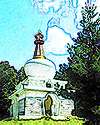Important
Facts About Tibetan Refugees

In 1949, the
Peoples Liberation Army of Communist China invaded Tibet.
For a period of ten years,the political and spiritual leader
of this sovereign nation, His Holiness the Dalai Lama, tried
to negotiate a peaceful settlement with the Chinese, but to no
avail. On March 10, 1959, His Holiness was forced to leave
his native land. He fled to India where he has since established
a Tibetan Goverment in Exile.
Following the
footsteps of His Holiness, were more than 80,000 refugees.
During the past 40 years, thousands of Tibetans have continued
to flee their homeland and settle in various places throughout
the world. The country of India has generously provided
Tibetans with refugee status and in the 1960s provided them some
land to live on. Meanwhile, the Communist Chinese goverment
continuesto destroy the country, the culture, and the environment
of Tibet. Most fearsome is the fact that the government
is displacing the population so that now the Chinese outnumber
Tibetans in many areas of the country. The Chinese have
attempted systematically to wipe out the practice of Buddhism. It
has destroyed more than 6,000 of Tibet's monasteries and has
imprisoned, tortured, and executed thousands of Buddhist monks
and nuns. All told, more than 1.2 million Tibetans have
died at the hands of the Chinese since the initial invasion.
At great risk
to their lives, Tibetans continue to leave Tibet. Parents
send their children to the monasteries in India in hopes that
they will receive an education there and be instructed in the
Buddha Dharma.
How can you
help these refugees? You can choose to sponsor a Tibetan
refugee by sending him or her $20 amonth. This small amount
of money will provide them with their basic needs and education.
The pictures linked to this page are of refugees that our monks
at the Tibetan Cultural Center in Bloomington, Indiana have a
special connection with. Please read about them.
Information about where to send your check accompanies each bio.
Learn more about the Gomang Monastary and the Refugees.



